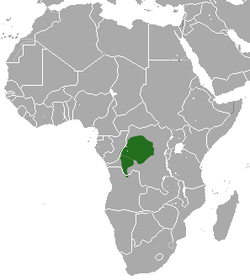| Black-crested mangabey [1] | |
|---|---|
 | |
| At Binder Park Zoo, Michigan | |
| Scientific classification | |
| Kingdom: | Animalia |
| Phylum: | Chordata |
| Class: | Mammalia |
| Order: | Primates |
| Suborder: | Haplorhini |
| Infraorder: | Simiiformes |
| Family: | Cercopithecidae |
| Genus: | Lophocebus |
| Species: | L. aterrimus |
| Binomial name | |
| Lophocebus aterrimus (Oudemans, 1890) | |
 | |
| native range | |
The black crested mangabey (Lophocebus aterrimus) is a species of primate in the family Cercopithecidae. It is only found in Democratic Republic of the Congo with a small habitat extending to Angola. Its natural habitat is subtropical or tropical dry forests. It is threatened by habitat loss. [2]
